John Hurrell – 28 May, 2012
'Assume Nothing' is one of those exhibitions where you become so visually amped up every little boxlike fitting projecting from the gallery walls - such as the humidity recorder - becomes a potential piece of sculpture. It showcases six artists associated with A Centre For Art, a collective who presented a large number of shows in small office spaces in downtown Auckland from 2007-2010, and who were often reviewed on this site and its earlier blog.
Auckland
Schaeffer Lemalu, Richard Bryant, Anya Henis, Patrick Lundberg, Richard Frater, Martyn Reynolds
Assume Nothing
Curated by Peter Shand
4 May - 23 June 2012
For the Gus Fisher this is an unusual minimalist show put together by Peter Shand. It’s one of those exhibitions where you become so visually amped up every little boxlike fitting projecting from the gallery walls - such as the humidity measurer or tremor recorder - becomes a potential piece of sculpture. Using fourteen works it showcases six artists associated with A Centre For Art, a collective who presented a large number of invited shows in a series of small office spaces in downtown Auckland from 2007 - 2010, and who were often reviewed on this site and its earlier blog. Some of the key personalities are currently doing post grad work overseas.
It’s a varied presentation of deliberately understated, intimately sized items. For example Frater and Lundberg present one sculpture each (Lundberg’s has 16 components, Frater only one), but Lemalu has five small paintings. It is a slightly unbalanced layout with most of the items on one long wall and the opposite wall largely ignored.
Schaeffer Lemalu‘s work consists of folded squares of delicately paint-stained tissue paper, sometimes more than one sheet together. He exploits the different folded thicknesses and textured surfaces of these translucent, fragile surfaces. Blurred pastel delineates a maple leaf shape in one work and in another angular blotches of grey appear positioned deep within, rising up through several layers. One uncharacteristically gorgeous tissue-paper painting has exuberant saturated colour in spiky ring formations that have darker intensities around the edges. It seems tropically floral in derivation.
Martyn Reynolds’ two aluminium sculptures are positioned one above the other. They are flat circular discs that are hinged at the top: rough hewn with rippling ground-in striations that catch the light. Both cleaved circles have a cut out vertical trough that approaches the middle, ascending from the bottom edge. The top sculpture has a quadrant sized chunk removed to expose a matt grey surface normally hidden inside, and the lower an inverted image of George Clooney emphasising its top lefthand corner. Formally the shapes of the celebrity photograph and removed outer portion reflect each other, generating a conversation between the notions of visible profile and hidden reality.
Two of the three works by Richard Bryant tease the viewer with questions of paper edge - is the dominant shape or stack of mottled bands the result of taped on paper or is it carefully painted, or a mixture of both? Another work with complicated marbling effects has a Max Ernst feel about it: marbling seemingly mixed somehow with decalcomania. It is amazingly fine in its minute detail, the image the result of some sort of oil and water separation method.
Anya Henis gets you guessing in another way. She makes simple sky scenes or landscapes with watercolour, imposes cursive texts over the top and then plops water over them so that letters within the words partially dissolve. It encourages the model of painting being a puzzle (James Elkins has written about this) for the attentive viewer to solve. The problem is, once you know ‘the answer’, where do you go to from there? You are stuck with a one-liner. Unless of course the images have some magical quality that draws you back for repeated looking and renewed interpretations, and I’m not sure that these do.
Richard Frater in the past has made some wonderful films but here he presents a small solitary sculpture. A thick, heavy-looking nail has had its stem sliced diagonally and very fine holes drilled into the two resulting, angled cut surfaces. Into these a thin needle has been inserted which holds the nail parts separate and hovering in position - in close proximity but never touching.
The work is enigmatic because of the hole in the needle’s own head, a foil to the flat blunt (now decapitated) head of the thick nail. Because it is so delicate the work can never be hammered into the wall but inserted into a carefully drilled hole so it looks hammered. The sculpture becomes a riff on threading and inserting, pondering the function of very basic tools and certain accompanying co-ordinating manual processes. It’s a remarkable work with a long wall all to itself.
No title, the painting by Patrick Lundberg - its sixteen, lollylike, painted gesso spheres ascending the wall and traversing a corner - makes you examine the paint application of each wee ball very closely: the uneven densities of the acrylic medium, the manually generated movements of Lundberg’s fine paint-loaded brush, the patterns and rhythms covering each curved surface, the glossy coatings.
With Assume Nothing Peter Shand has put together a nice sampler of these artists’ works. Some you’d like to see more of but in this university space there are good resonating points of comparison - Frater with Lundberg (small intimate sculptures), Lemalu with Bryant (interest in edge), Reynolds with Henis (obscuring the recognisable) - that lead you in. Shand’s essay exhorts you to look closely without providing details, but the show is not esoteric or intellectually cold. It’s fun to explore.
John Hurrell
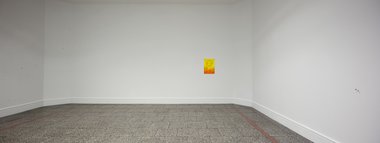
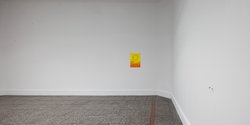




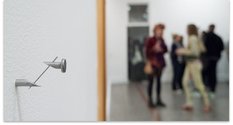


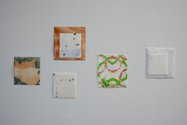
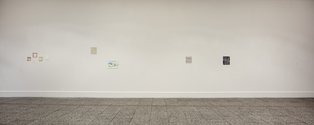

 Two Rooms presents a program of residencies and projects
Two Rooms presents a program of residencies and projects Advertising in this column
Advertising in this column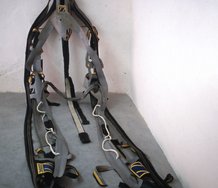
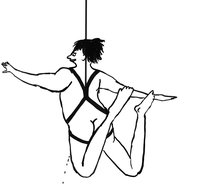
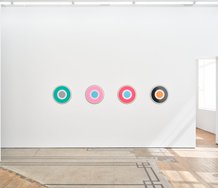
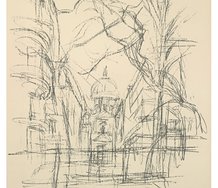
This Discussion has 0 comments.
Comment
Participate
Register to Participate.
Sign in
Sign in to an existing account.